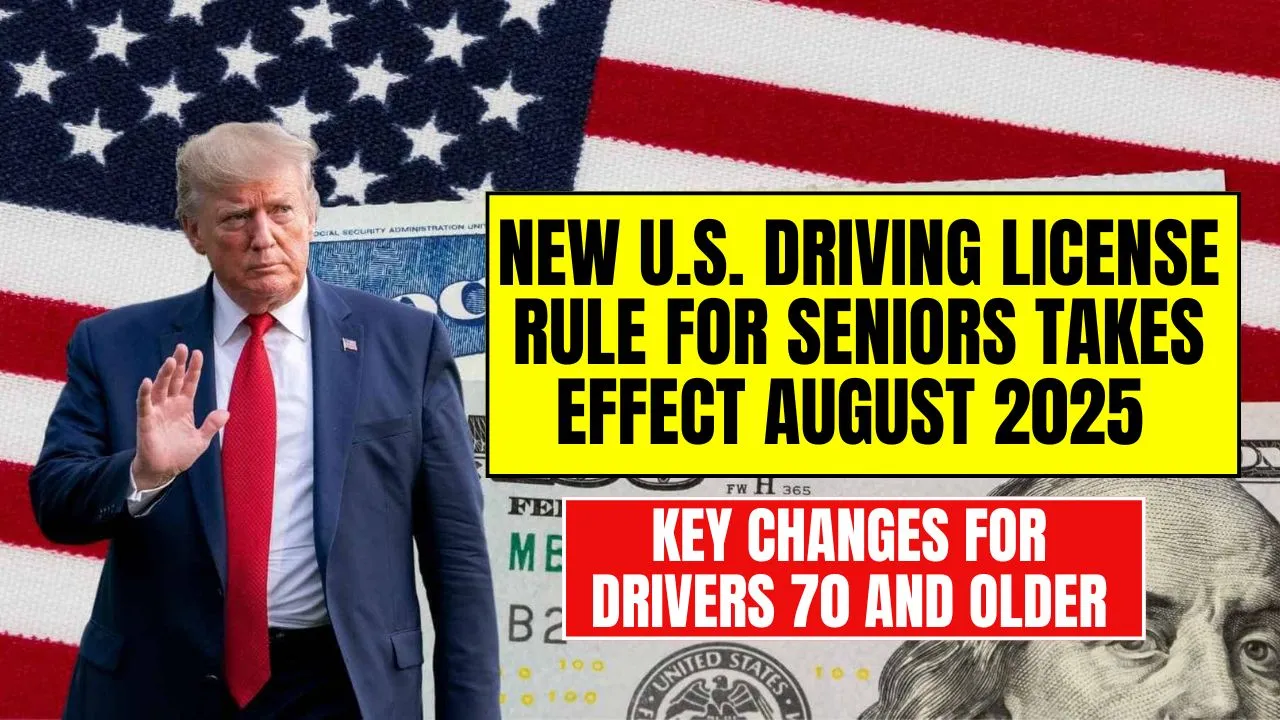U.S. Driving License Rule for Seniors: The U.S. Driving License Rule for Seniors is about to bring some of the biggest changes older drivers have seen in decades. Starting August 2025, drivers aged 70 and above will face new requirements designed to improve road safety without taking away their independence. If you’re in that age group—or you have a parent or grandparent who is—this update could affect how and when you renew your license.
This new U.S. Driving License Rule for Seniors focuses on keeping drivers safe while still allowing them to stay mobile and independent. From mandatory vision screenings to annual road tests for the oldest drivers, the changes are a mix of safety checks and supportive measures. In this guide, we’ll break down exactly what’s changing, how it will work in different states, and what you can do to stay ready.
U.S. Driving License Rule for Seniors – Overview of Changes
The new rules, set to roll out nationwide in August 2025, will affect every driver aged 70 and above. While the federal guidelines set the baseline, states can—and will—make adjustments. The core changes include vision tests at every renewal for drivers over 70, possible cognitive testing for those over 80 if concerns arise, and mandatory annual road tests for drivers aged 87 and older. These measures aim to balance safety with freedom, ensuring that age alone isn’t the deciding factor in whether someone can keep driving.
Overview Table – U.S. Driving License Rule for Seniors 2025
| Age Group | New Requirement |
| 70+ | Mandatory vision screening at each license renewal |
| 80+ | Cognitive screening if flagged by DMV, doctor, or family member |
| 87+ | Annual road test required to keep license |
| Any age | DMV review possible if safety concerns are reported |
Vision Test at 70 and Above
Once you hit 70, you’ll be required to pass a vision test every time you renew your license. This will check distance vision, peripheral vision, and your ability to handle glare or changes in light. Glasses and contact lenses are fine—as long as your prescription is current. Good vision is essential for spotting road hazards, reading signs, and reacting quickly to unexpected situations.
Cognitive Screening for Drivers Over 80
If you’re over 80, you won’t automatically face cognitive testing. It only comes into play if concerns are raised by a DMV staff member, doctor, or even a family member. The test is designed to measure reaction times, memory, and decision-making—skills that directly affect driving safety. It’s not about intelligence; it’s about making sure drivers can handle complex traffic situations confidently.
Annual Road Test for Drivers Over 87
Once you reach 87, you’ll need to complete a road test every year to keep your license. These aren’t meant to be intimidating—think of them as a yearly check-in to make sure you can handle real-world driving situations like merging onto a highway or reacting to pedestrians. The goal is to keep drivers safe, not to force them off the road.
What Happens If You Are Reported to the DMV?
If someone reports that you may be unsafe behind the wheel, the DMV won’t just take your license away. Instead, they’ll review the situation and may require testing or impose restrictions. This process acts as a safety net, ensuring that drivers who need help or adjustments can still maintain as much independence as possible.
State-by-State Differences
While the federal rules set a foundation, states will have their own versions. Here are a few examples:
- California – In-person renewals required for drivers 70+
- Florida – Vision testing begins at age 80
- Texas – Annual renewals for drivers 85+ with extra tests
- New York – Cognitive testing possible at DMV discretion
Always check your state’s DMV website before your renewal date to avoid surprises.
Tips for Staying Road-Ready Under the New Rules
Here are a few practical steps to keep your driving skills sharp and meet the new requirements:
- Get your eyes checked before your license renewal date
- Avoid night driving if your vision struggles with glare
- Take a senior driver safety course (could lower your insurance)
- Review any medications with your doctor to avoid side effects that impair driving
- Practice in low-traffic areas if you’re feeling rusty
Restricted Licenses – A Flexible Option
Failing a vision, road, or cognitive test doesn’t always mean the end of your driving days. Many states offer restricted licenses, which might limit you to daytime driving, short distances from home, or avoiding highways. These tailored restrictions keep you on the road in a safe and controlled way.
Alternatives When Driving is No Longer an Option
If driving eventually isn’t possible, there are more alternatives than ever before:
- Ride-share services like Uber and Lyft, with senior-friendly features
- Community shuttle programs through local senior centers
- Paratransit services for those with mobility limitations
- Volunteer driver networks for affordable, friendly rides
These services can keep you connected to your community and maintain your independence without a car.
This Rule Is About Safety, Not Age
The U.S. Driving License Rule for Seniors isn’t about setting an age limit—it’s about ensuring drivers are capable and safe. Many people in their 80s and even 90s still drive well, and these changes are designed to support them, not sideline them. With preparation and awareness, you can keep your keys and your freedom for years to come.
FAQs
Do seniors automatically lose their license at a certain age?
No. Your driving privileges depend on passing the required tests, not your age.
Is the annual road test mandatory for everyone over 87?
Yes. Starting August 2025, all drivers aged 87+ must pass an annual road test.
Can a family member get my license taken away?
Not directly. They can report concerns, but the DMV will review your case before taking action.
What happens if I fail a renewal test?
You might qualify for a restricted license that allows limited driving under certain conditions.
Do these rules apply the same way in every state?
No. Federal guidelines apply, but each state sets its own specific rules.
Final Thought
The U.S. Driving License Rule for Seniors is a change worth preparing for, not fearing. By staying proactive—getting regular eye exams, practicing your driving skills, and knowing your state’s requirements—you can keep enjoying the freedom of the open road. This isn’t about taking your keys away. It’s about making sure every trip you take is as safe as it can be.












